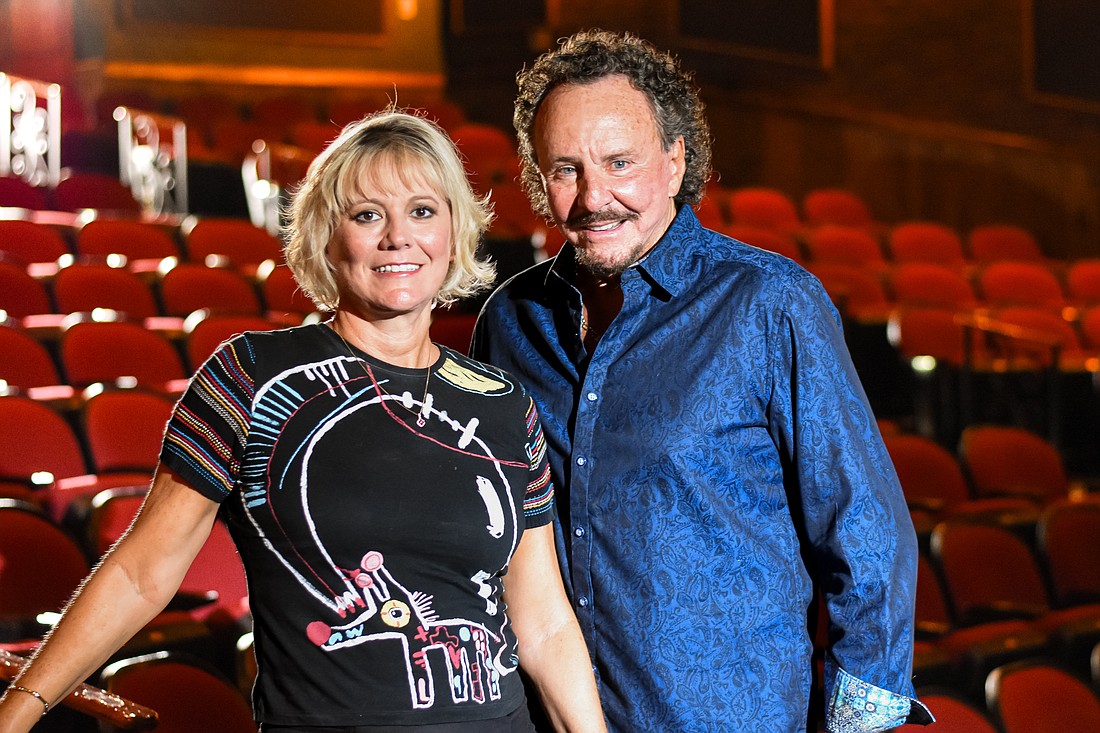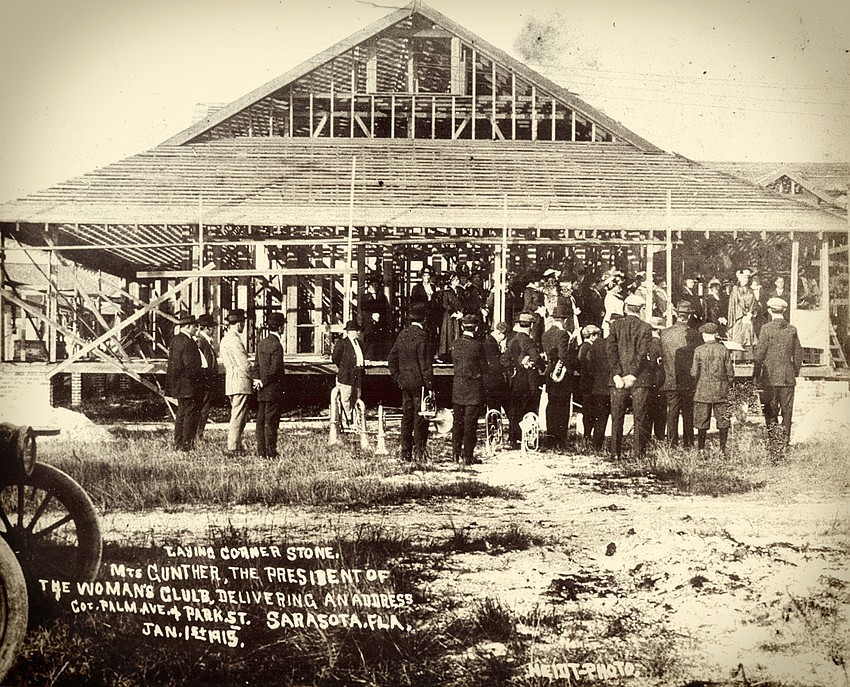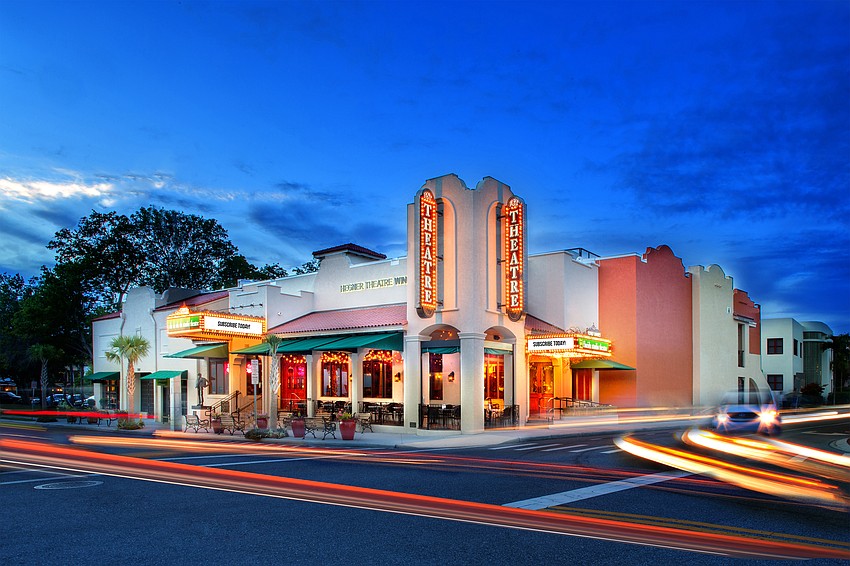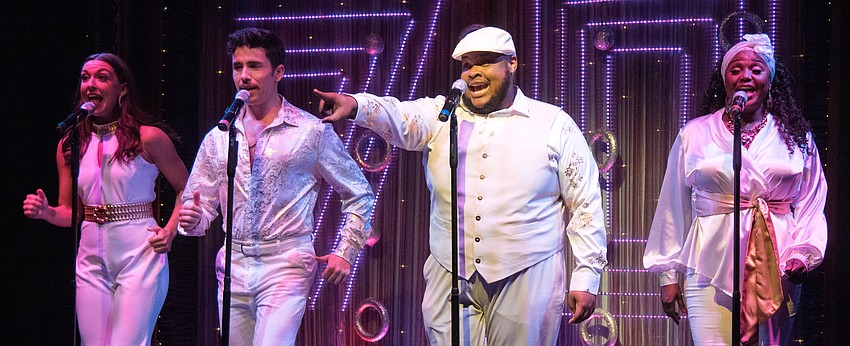- November 21, 2024
-
-
Loading

Loading

A book written to commemorate the 50th anniversary of Florida Studio Theatre would need to devote countless pages to its CEO, Richard Hopkins, who joined FST 43 years ago, and his wife, Rebecca Hopkins, who came as marketing director in 1998 and was named managing director five years later.
For better or worse, for richer or poorer, the story of FST is the story of the Hopkinses. Luckily for Sarasota theatergoers, there’s been a lot more better than worse and the theater’s productions, stages and outreach programs for children and playwrights of all ages have grown richer, not poorer, through the years.
Along with The Sarasota Players, the community theater now in its 94th season, and the Asolo Repertory Theatre, which has grown from a festival launched in the late 1940s into southeastern Florida’s largest Equity theater, FST is a veritable theatrical institution in Sarasota. But with a dizzying number of plays, musicals, cabaret shows, festivals and workshops throughout the year, it is in a league of its own.
Thanks to the Hopkinses, FST stands as a towering example of a regional theater that makes first-rate live entertainment accessible and affordable, day in and day out. It is a truly exhausting endeavor, and rather than crown Richard and Rebecca Hopkins king and queen of the theater prom, I’ll don them with the medals of marathoners. They are champions of endurance, to be sure.
And they’ve got the trophies to prove it. There are too many to mention, but in 2017, Hopkins was awarded the Florida Theatre Conference Lifetime Achievement Award. He and Rebecca both received the Luminaire Award in 2016 for promoting the future of the arts in Sarasota. That honor followed the 2012 Cultural Champion Award for both Hopkinses from the Arts and Cultural Alliance of Sarasota County.
Make no mistake, FST’s leading man and lady get plenty of help from supporting players. Among their able artistic crew are associate director Sean Daniels, associate artist Catherine Randazzo, who has a big hand in cabaret productions, and associate director at large Kate Alexander, to name just a few key players.
It’s not mouthing a platitude to say everyone is a key player at FST, where the production team led by director Ahkim Church keeps everything on a high level despite a restrained budget.
The Hopkinses’ frugal ways can be chafing to actors and other theater folk who long for frills and fatter paychecks, but the theater is thriving while many other regional venues across the U.S. are struggling.
When you look at the milestones during FST’s 50-year history, there are only two that precede Richard Hopkins’s arrival. The first is the founding of FST as a touring company by Jon Spelman in 1973. The second is getting use of the original home of the Sarasota Woman’s Club at 1241 N. Palm Ave. That 1914 building was bought and renovated three years after Hopkins’s arrival at FST.

Make no mistake. This is the house Hopkins built.
Let the numbers speak for themselves. When Hopkins became FST’s producing artistic director in 1980, he founded the theater’s main stage series with just 106 subscribers. Today, FST reaches over 38,000 subscribers through a variety of programs. That makes it the largest subscription theater in Florida, one that touches 200,000 people annually.
On the real estate front, FST has grown to what it calls a “village” of five theaters. There’s the Gompertz Theatre, the Keating Theatre, Bowne’s Lab (used for improv and other experimental fare) and two cabarets, the Court and the Goldstein. The Sudakoff Administration Building houses FST’s offices, costume shop and three commercial rental spaces.
But FST’s physical expansion isn’t over yet. In March 2022, it announced plans to build the 11-story Mulva Arts Plaza in downtown Sarasota at a cost of at least $28 million. The new building will add a new main stage and two new cabaret theaters to the FST campus, affordable housing for actors and arts workers and 200 parking spaces.
Why does FST want to jump on the downtown development bandwagon by building a skycraper in its cozy little theater village?
The area’s shortage of affordable housing makes it imperative that FST provide accommodations for its visiting actors and its arts workers, Hopkins says in a wide-ranging phone interview. While one gets the feeling that Hopkins doesn’t suffer fools gladly, but he’s not put off by provocative questions.

To accommodate the theater’s continued expansion as more visitors come to town and out-of-towners retire and relocate here to work remotely, the theater needs more parking, Hopkin insists. And the new stages will help fuel FST’s growth.
But wait. Hasn’t Hopkins heard that regional theaters are laying people off, curtailing their schedules and even closing? Places like New York City’s Public Theater, LA’s Mark Taper Forum, Chicago’s Lookingglass Theatre Company and the Westport Country Playhouse have been hurt by sharp declines in subscription sales since the pandemic. The end result is what industry publications such as American Theatre are calling a “crisis.”
“This isn’t about Covid,” Hopkins declares. “This was happening before the pandemic.”
The way Hopkins sees it, some storied theaters have lost touch with their community (one of his favorite words). They’re offering material that may be too edgy, on the one hand, or too predictable, on the other, at prices that many people can no longer afford.
Where else in the country can you see four main stage productions for a subscription price of $69? Or three cabaret shows for $49? According to Hopkins, not many.
Even though they were interviewed separately for an article on FST’s 50-year history, both Richard Hopkins and Rebecca Hopkins remained firmly focused on the present — and the future. Both had to be prodded to talk about the past.
Pressed to name a few of FST’s greatest hits on the main stage and in the cabaret, they both pointed to shows from last season: the play “Network,” based on the popular film of the same name about a news anchor who goes berserk, and the musical revue “The 70s: More Than a Decade.”
“The 70s,” created by Rebecca Hopkins, Richard Hopkins and Sarah Durham, featured the music of The Who, Harry Chapin, the Bee Gees and Marvin Gaye, among others.

Directed by Randazzo with musical arrangements by Jim Prosser, “The 70s” closed on Feb. 12 after a 19-week run in the Court Cabaret. It returned in March for an encore run in the Keating Theatre, a larger venue, where it finally closed April 9.
The Hopkinses are hoping for that same kind of magic with “Up on The Roof,” another musical collaboration between the two with additional support by Sarah Durham. The show about the music written by songwriters in New York’s legendary Brill Building, post-Elvis but pre-Woodstock, features Jannie Jones, Jacquelyne Paige, Joey Panek and Brandon Wardell.
Jones is well known to Sarasota audiences for her 2019 star turn in “Ethel Waters: His Eye is on the Sparrow.” That show was a revival of FST’s 2005 world premiere of Larry Parr’s musical biography about the celebrated actress and singer who rose to stardom from poverty.
At a recent performance of “Up on the Roof,” Jones won loud applause and cheers from the audience in the Court Cabaret for her rousing performance of “(You Make Me Feel Like) A Natural Woman,” written by Brill Building spouses Carole King and Jerry Goffin. King sang the ballad on her triumphant 1971 album “Tapestry,” but Aretha Franklin’s soulful cover has stood the test of time.
A lot has changed during the tenure of Rebecca Hopkins, who has created many of FST’s hit cabarets. The first is the line between the season and the off season has all but disappeared, not just measured by the traffic on Sarasota streets, but by the number of FST productions. She is the first to agree with the oft-heard observation, “There is no off season anymore.”
But the rapid growth of Sarasota, particularly post-Covid is not as potentially life-changing to FST and the local theater community as the advent of artificial intelligence. Some of the dangers of plagiarism and fraud posed by AI-powered language tools like ChatGPT prompted the recent writers’ and actors’ strikes in Hollywood.
Bottom line: Who needs humans to write and act when computers can do it faster than better? Hopkins is not a believer. “When I was working on the libretto (spoken word section) for ‘Up on the Roof,’ I asked ChatGPT to write a musical. It wasn’t bad, but what bothered me is all the mistakes. ChatGPT is getting its information from sources on the internet that are wrong.”
It looks like writers of musical revues and other shows won’t be losing their jobs just yet.
But is there anything else on the horizon that could knock Sarasota from its throne as Florida’s cultural capital? Richard Hopkins thinks so. And what concerns him isn’t the shortage of affordable housing and parking. It’s the waning of kindness.
Before he met Rebecca (both agree it was pretty much love at first sight), Hopkins was thinking about leaving Sarasota. “San Francisco was one of my favorite places, but everyone was always in a fight there,” he says. “The right hated the left and the left hated the right. They couldn’t agree on anything. There was no middle ground.” That’s starting to happen in Sarasota, he says, and indeed everywhere in the U.S.
Hopkins worries that Sarasota’s longstanding tolerance for oddballs and outcasts that owes much to its circus heritage is disappearing. “For as long as I’ve been here, Sarasota’s interactions have been relational, not transactional,” he says. “There’s no question we have to make money, but when business is driven by the sound of the cash register and not passion, we will have lost something.”
Being a long-haired, theater type, Hopkins is not afraid to name it: Heart.
Correction: This article has been updated to state Rebecca Hopkins began as marketing director in 1998.